18 Nov
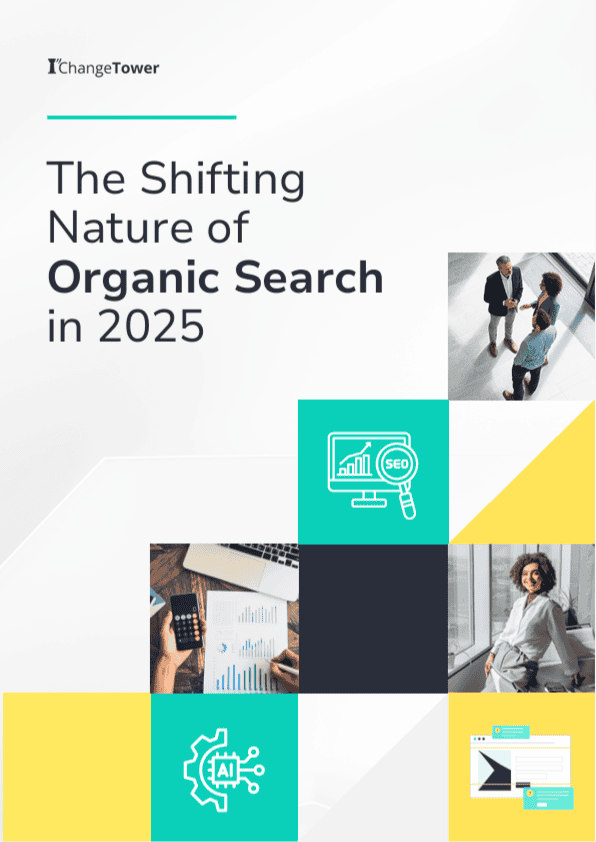
The Shifting Nature of Organic Search in 2025
For decades now, search engine optimization (SEO) has been viewed as a “cheat code” channel – a method for businesses of any size or budget to achieve organic growth and scale against larger competitors. Industry research over the past two years has valued the SEO industry itself at over $150 billion, and projected to grow by an additional 20% by 2030, as there are thousands of case studies evidencing the value of investing in SEO as a growth channel.
While “the death of SEO” has been predicted during several periods of technological evolution in the past (the rise of social media most notably), the industry has continued to expand reliably since the launch of Google in the late 1990s. However, the emergence of AI chatbots and search capabilities in the past few years has caused arguably the greatest disruption to the industry in its brief history.
SEO professionals and clients relying on SEO as a growth channel have grown understandably concerned as a result, facing some existential challenges and questions:
- As search shifts to a more conversational approach, will businesses still be able to access Google search traffic at rates of the past?
- With AI algorithms much less predictable than standard search, can SEO professionals actually offer the value needed to justify marketing budget investment?
- How is attribution affected by a search landscape that relies less on link clicks and more so on brands appearing in search conversations?
- What will the future of search look like?
While the future of search remains in flux as the AI tools driving this shift are constantly changing themselves, underneath the noise there are some significant learnings about the current and future state of search to help guide strategic decision-making around SEO right now. Let’s explore the transformation of the industry since the debut of OpenAI’s ChatGPT in 2022, dive into some of the notable learnings about search since, and understand how ChangeTower is working with SEO professionals to adapt to the needs of AI search optimization.
Timeline of Key Shifts in SEO Since 2022
2022 – ChatGPT Launches (OpenAI)
- Significance: For the first time, millions of users interact with AI in a conversational, search-like way. Marketers begin asking: Will AI replace Google search?
- Impact: Brands realize that “answers” matter more than just “links,” planting the seeds for optimizing content for AI discovery.
2022 (Sept) – Google Helpful Content Update
- Significance: Google introduces a system designed to reward people-first content rather than content designed only for search engines.
- Impact: Marketers need to focus on expertise, originality, and readability over keyword stuffing.
2023 – Search Generative Experience (SGE) Testing by Google
- Significance: Google begins testing AI-powered snapshots directly in search results.
- Impact: SEO shifts from competing for “blue links” to competing for AI-summarized mentions.
2023 (March) – GPT-4 Released
- Significance: More advanced AI models can digest, summarize, and explain web content with greater accuracy.
- Impact: SEO professionals start experimenting with “AI readability” — making sure content is structured in ways machines can easily interpret.
2023 (Fall) – EEAT Becomes Central
- Significance: Google doubles down on Experience, Expertise, Authoritativeness, and Trustworthiness as ranking signals.
- Impact: Content strategies now emphasize author bios, citations, and transparent sourcing.
2024 – Generative AI Search Expands
- Significance: Microsoft Bing integrates GPT-4 across search. Google expands SGE beyond beta.
- Impact: Businesses notice fewer clicks from traditional search, but higher importance of being cited in AI summaries.
2024 – Core Updates Emphasize Helpful, Fresh Content
- Significance: Google rolls out multiple updates prioritizing recency and topic authority.
- Impact: SEO becomes about maintaining ongoing freshness (updating content regularly) rather than “publish once and forget.”
2025 – Generative Search Becomes the Default
- Significance: AI-driven answers are now standard on most major search platforms.
- Impact: Brands must adapt to optimize for AI answers, not just search listings. The competition is no longer just ranking #1 on Google, but also being the source cited in an AI-generated response.
2025 (September) – Google Limits Crawler Abilities
- Significance: Google reduces the ability for SEO crawlers to easily scrape results beyond Page 1, severely limiting real-time data beyond Top 10 positions.
- Impact: Crawlers (both SEO monitoring tools and AI crawlers) must now spend 10x to scrape the same amount of data, with ramifications for their quality in the future.
Key Data to Know About the Current Search Landscape
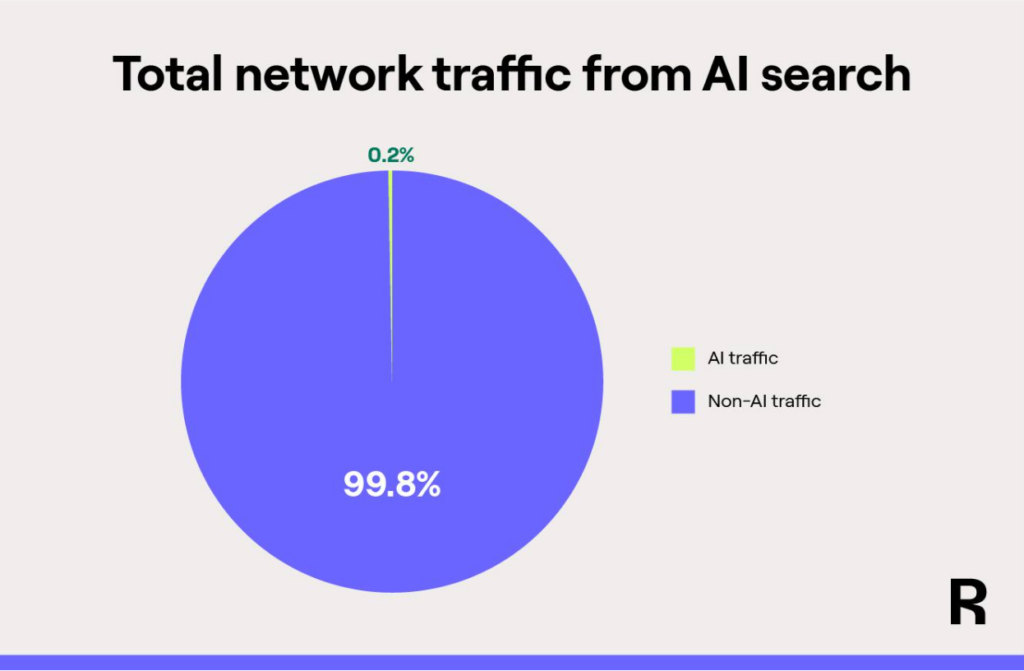
While AI search has received significant hype over the past few years, and companies are clamoring for AI search strategies, the reality is that non-AI traffic (via typical sources like Google, Bing, and Yahoo) remains the overwhelming majority of all organic search traffic for businesses. AI search adoption will need to continue exponential growth for years at current pace to become a significant share of organic search traffic.
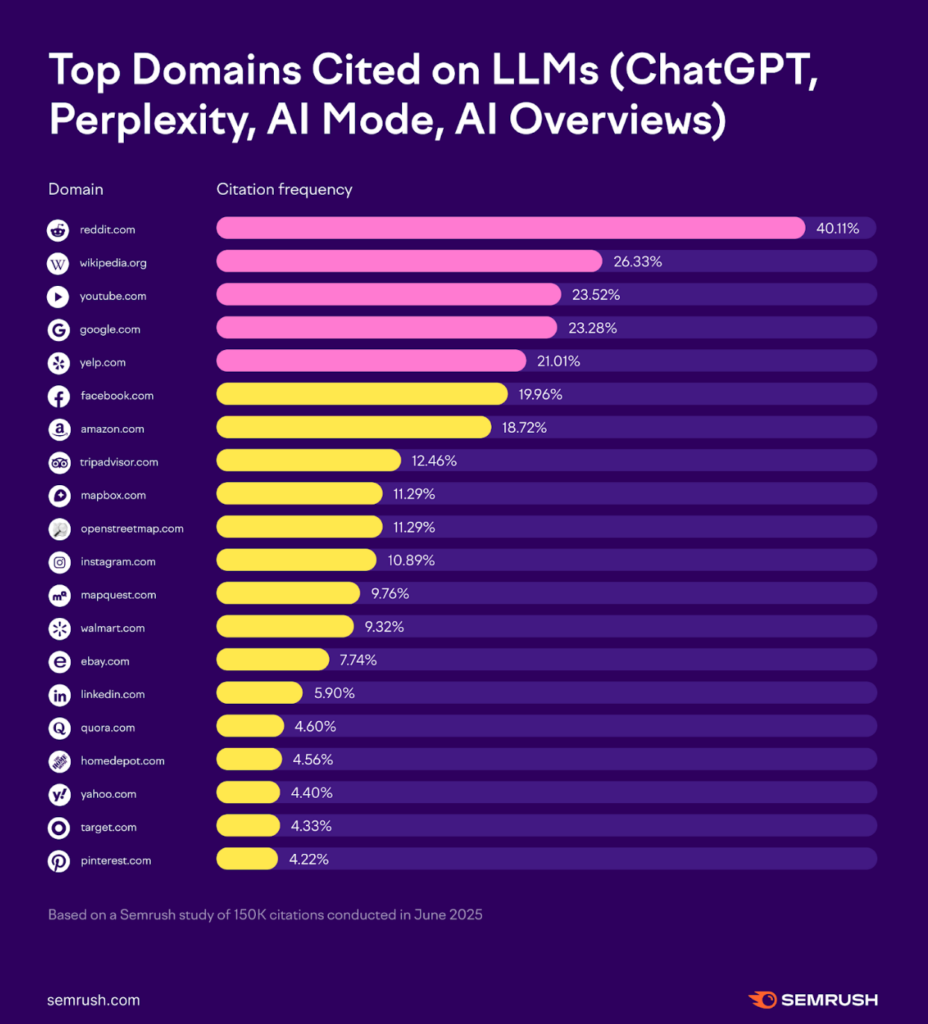
Top cited domains for AI search offers a significant change from traditional search. Social platforms (most prominently Reddit) are among the most-cited sources for AI search engines, along with review platforms (like Yelp or TripAdvisor). This shift in trusted sources is significant when considering investments in additional channels needed to boost organic search efforts.
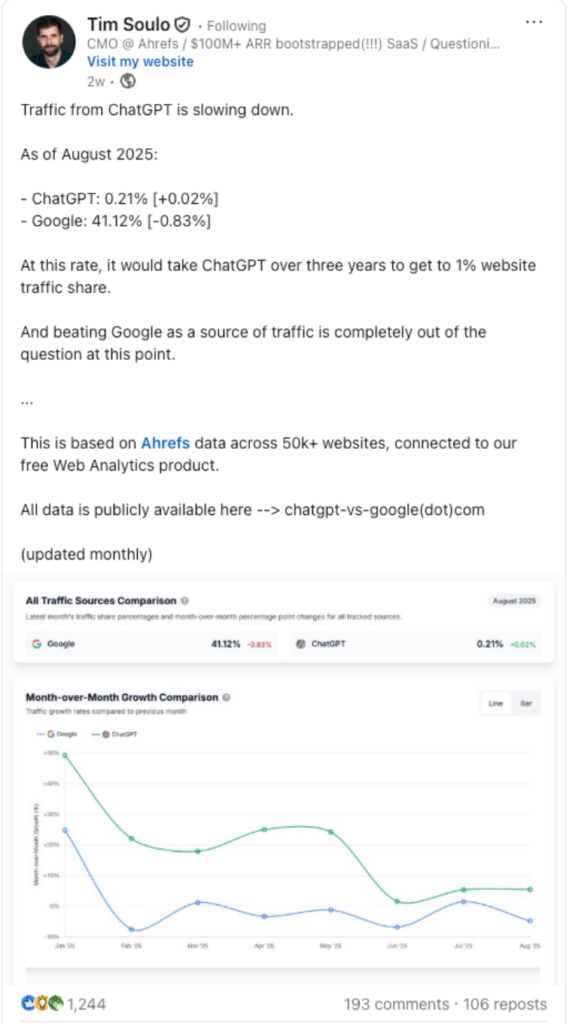
What we do know about AI search optimization
The rules of the SEO game look very different in 2025. Here are the biggest shifts and what they mean:
1. Content Recency Matters More Than Ever
- What it means: AI systems and Google’s AI-powered search now prioritize up-to-date information.
- Example: A financial advisor’s blog updated in 2025 on “best retirement strategies” will outrank a 2021 blog, even if the older one has more backlinks.
- Takeaway for clients: Your website content is not a “set it and forget it” asset — it must be updated continuously. Yearly or quarterly content updates are the new standard.
2. Structuring for AI Readability
- What it means: Content that’s broken into clear sections (headings, bullet points, FAQs) is easier for AI to interpret and summarize.
- Example: A law firm that writes an FAQ page (“Can I break my lease early?” with short, direct answers) is more likely to appear in AI responses than one with long, dense paragraphs.
3. Query-Focus vs. Keyword-Focus
- Old SEO: Targeting “keywords” like best restaurants Chicago.
- New SEO: Targeting the user’s question → “What’s the best restaurant for a birthday dinner in Chicago?”
- Example: AI doesn’t just match keywords — it matches intent. Brands must write in a natural, conversational way that answers the question being asked.
4. External Brand Mentions Carry More Weight
- What it means: It’s not only about who links to you — but also who talks about you.
- Example: If industry publications mention your company by name (even without a link), AI systems may still cite you as an authoritative source.
- Takeaway for clients: PR, partnerships, and reputation management are now SEO strategies too. This means social platforms (primarily Reddit), review sites, and more.
5. Authority & Trust Signals Are Non-Negotiable
- What it means: AI and Google increasingly filter results to feature trusted voices.
- Example: Health content must feature licensed professionals. A blog about mental wellness without author credentials is unlikely to appear in AI results.
- Takeaway: Demonstrating expertise on your site is as important as what you write.
6. Technical SEO and Crawlability Remain Key
- What it means: AI crawler ability to access, navigate, and synthesize your site’s content is essential to shaping AI search results and citation placements.
- Example: Sites with heavy use of JavaScript are functionally hiding content from AI crawlers, preventing their ability to read and include your content in results.
- Takeaway: Technical audits for AI crawlability, site speed, and UX are even more important than before.
How SEO professionals are leveraging ChangeTower to navigate modern AI search optimization
Modern SEO is a moving target. Search results, competitor strategies, and on-page experiences shift constantly — often without warning.
ChangeTower enables SEO teams to track competitor websites, landing pages, and SERP-linked assets for updates that could impact rankings or messaging.
Use it to:
Detect when competitors publish new content or optimize existing pages.
Track changes to meta titles, descriptions, schema, and keyword targeting.
Monitor pricing pages, feature comparisons, or new blog launches that reveal shifting content strategies.
By identifying these trends early, SEOs can adapt faster — ensuring their brand’s strategy evolves in step (or ahead) of the competition.
Technical Auditing and Planning
Search visibility depends as much on site health as on content strategy. Even minor layout or script changes can affect crawlability and indexing — especially in AI search environments.
ChangeTower provides continuous oversight for critical site elements that impact SEO performance, including:
Core metadata and structured data changes.
On-page content shifts that might alter ranking signals.
Unintended changes in navigation, redirects, or robots directives.
By automating change detection, SEO teams can spot technical regressions before rankings dip, supporting more proactive audits and stable site performance.
Omnichannel Monitoring
Today’s search footprint extends far beyond your website. AI-generated answers, third-party listings, and content syndication all shape how audiences find your brand.
ChangeTower helps SEO professionals monitor brand presence and reputation across multiple digital touchpoints, including:
Third-party review sites, partner listings, and affiliate pages.
Media mentions, product comparison platforms, and resource directories.
AI and search engine-generated content where brand citations appear.
This omnichannel visibility allows marketers to identify where brand signals are strongest — and where they’re missing, closing the loop between content creation, visibility, and ongoing optimization.
Adam Hausman has worked with ChangeTower since its founding in 2018 and is passionate about the potential of website monitoring software in industries including SEO, compliance monitoring, competitive intelligence, and more. Also founder of Greenlight Growth Marketing, he holds degrees from Indiana University (BA English/Psychology 2008) and the University of Illinois-Chicago (M.Ed. Secondary Education 2012). He lives in Maine with his wife, 2 kids, and 2 annoying cats.
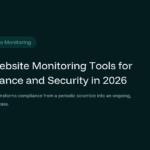
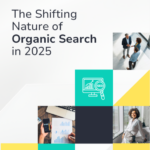
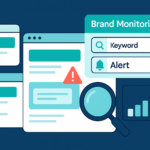
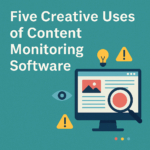
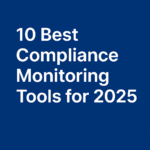
Adam Hausman